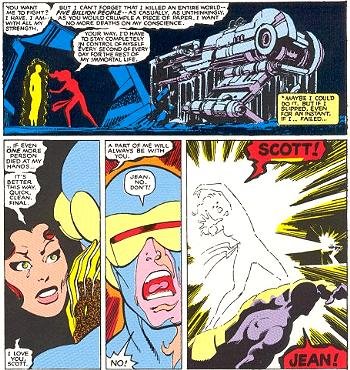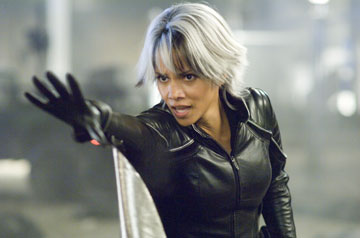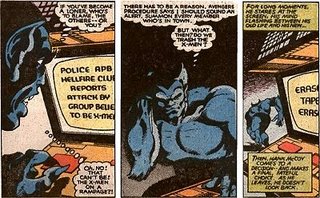[I assume you've seen the film. If not, I solemnly swear to take no prisoners and to spare no plot points. This is not a review so much as it's a sort of... "assessment." An annoyed one.]X-Men 3: The Final Movie
Or we pray it is the final installment in this stalled series. Where to begin with the list of grievances and missed opportunities? Where to begin....
I should start by saying that I really liked the first two movies. Or I should say I loved the first one, and enjoyed the second. When I learned Singer was leaving the franchise, I did not ask for whom the bell tolled (I could hear it in the distance). The tolling became deafening when I read the auteur responsible for
Rush Hour,
Rush Hour 2, and
Red Dragon was the new man at the helm. After seeing the final product, I was not let down by what I found.
X-Men 3 is NOT saved by Jackman, McKellen, and Stewart--whom, I might point out, are all non-American actresses. They do the best job they can with weak material, but the dialogue is just shit, and each of them says some truly stoooopit, out-of-character stuff. Stewart has to snit at Jackman--after the living hell of explaining the film's version of the Phoenix; McKellen does the best he can with, "WHAT HAVE I DONE?!"; and Jackman comports himself well with his "JEEEEAN!!!!"
Nothing can save the film from the awfully idiotic choice of writing Magneto to go off the callous deep end: his egging Joenix on, his heartless dropping of Mystique after she saved his ass and as a result lost her powers ("DAMN. That shit is COLD," I actually said out loud), his decision to use the mutant "cure" against other mutants, and most egregious his sending the Morlocks to their deaths in the final battle sequence, dismissing them with a gloating smile as "pawns." Nice brotherhood you got going there, Magneto. After the first two films spent so much time presenting Magneto as a textured, complex character, this latest edition pulls no punches and displays him in full fascist--Holy
Richard the III, Batman--mode. Too easy. And lame. Did I mention lazy?
Now to pile up the corpses.
Halle BerryThank god they got Tina Turner to lend Halle one of her old wigs from the 80s.
"It's okay, Jackie!"
I mean, the wig in the first film was AWFUL, the second wig was a slight improvement, but this one is an affront to humanity (the filmmakers even refer to it directly in an icky moment between Storm and the Beast when Berry squeals, "You've changed your hair!" And the Beast notes, "So have you." Not enough). Anyway, Storm has a larger--a
much larger--role in "Final," and it becomes eminently clear why
Singer kept her lines down to a minimum in the first two films: the woman can't act. Compare the cut scene on the first X-Men DVD in which Storm teaches a class of mutants. Awful. Every word she utters is a lie, including "a" and "the." No, that implies too much intention--she doesn't know what the fuck she's doing. Okay, Halle. HALLE! Repeat after me: Storm is a what? A
what? You don't know? Storm is an
African Weather Goddess. She is regal. English is not her first language. I know, honey, I know, don't cry, baby. I know,
accents are
hard. But you're getting paid. You are a
professional actress. Get to work.
Berry is so laughable with almost every syllable she utters. She's made Storm all sassy 'n' shit--watch her tell off Wolverine. You go, girl!
Snap! Snap! She does Storm like she's just this side of white from Kim and Cookie. And every time she uses her "weather-witch" powers she goes all slack jawed like she's having a seizure (the whited-out, Little Orphan, Annie Eyes don't help). Ok, remember in the first film when Sabretooth is chocking the goddamn out of her in the train station, and she goes all slack and mouth-breathery in the face, and you think she's dying, then her eyes go all white and she calls down lightening from the heavens? It's like that every time in this movie. Oh, I'll vomit if I go on. Fire her.
Beast
Why hire Kelsey Grammer to do Hank McCoy? I dunno, because no one's looking to hire him to do Shakespeare again any time soon, and maybe he needed the work. But he's okay more or less. It's the atrocious make-up they've saddled him in that hurts the soul so. Okay, he's BLUE. He's fucking
blue.... I can't help thinking Singer would not have been so literal. Just see for yourself.
Dr Jekyll or Papa Smurf, I presume.
Now, this is what the Beast is
supposed to look like, as rendered back in the day by John Byrne at his prime (inks by Terry Austin).
First of all, the Beast is kinda sexy, even covered in fur. But come on people, make him blue-black or something. Whatever.
The MorlocksSome genius working on this movie thought it would be way cool if the living-in-the-sewers, outcast, underground mutants, known as the Morlocks should all be various ethnic minorities, and dressed like some horrible, post-apocalyptic, fashion mistakes, fresh as hell from the 80s. I mean, honestly, they look like characters visiting from the set of a Pat Benatar music video. It's sorta analogous to the S and M themed costumes for Two-Face's gang in the Val Kilmer
Batman Forever fiasco. Remember them? Someone who has no idea what they're doing thinks something they know nothing about looks cool, so that over-determined design makes it into the movie. The image resonates, that's enough; it doesn't really matter what it might mean.
Hey! In a mutants-as-queer franchise, let's make the Morlocks all Latin or sorta Asian or sorta androgynous. What a great idea! There's such a misguided, bad-faith race, class vibe about this choice that my skin crawls. Except for Halle (and, let's not kid ourselves too much about her, anyway), all the major players are white white white. Then having Magneto send these "pawns" to their deaths for his cause--which superficially includes them--is simply repugnant. And this from a Holocaust survivor.... Yeah, bigoted Magneto's all about the end-justifies-the-means. This move drains all the nuance out of the character--it's just sad to see McKellen put through his paces this way. It doesn't serve the narrative or the character, it just makes him into the easy villain of the piece. Why make his morally complicated decisions interesting or even intelligible when he can just be a dick?
PhoenixOkay, this is where the serious geek factor enters the conversation: Yes, I was a big X-Men fan back in the day when the Phoenix/Dark Phoenix saga was first published. X-Men writers since then have hopelessly muddled it--I gave up trying to follow the latest convoluted explanation for Phoenix long ago, having lost all desire to know or care. But when the story first came out, it was clean and relatively simple: Jean Grey, selflessly saving her teammates, perished in a radiation storm while piloting their ship back into the earth's atmosphere. The ship crashed and she emerged with much greater powers, a new costume, and a new name, "Phoenix." In a major, very cool plotline, an old X-Men villain, named Mastermind (he's an illusion-caster, and was re-tooled as Jason Stryker in the second X-Men movie), was able to enter her mind, and essentially alter her personality, making her the Black Queen of the Hellfire Club (don't ask, just know it's as bad as it sounds). Thanks to Scott (Cyclops) she came to her senses, but the damage was done. Mastermind's manipulation had unleashed a power-hungry side of herself that manifested, just as soon as they defeated the Hellfire Club, as the ridiculously powerful Dark Phoenix. She flew off into space, consumed a star (yes, you read that right), which had the unfortunate side-effect of destroying a planet of asparagus people. That's right, asparagus people. Dark Phoenix returned to earth, fought the X-Men, and with Xavier's help, Jean was able to reassert her personality and place "psychic blocks" which would keep her extraordinary, cosmic-level psychic abilities under wraps. All seemed good until a race of aliens arrived to claim justice for the poor dead asparagus people. In a fight with the aliens (on the moon, no less), Jean reverted to Phoenix, and knowing she couldn't control her power indefinitely, telekinetically triggered a space cannon to blast herself into smithereens.

She's dead, Jim.
As you can see, only a small handful of these elements found their way into the screenplay for
X-Men 3. What Bryan Singer had in mind when he decided at the last minute to re-shoot the ending of
X-Men 2, so that Jean died, complete with a "Phoenix Effect" in the water at the very end, is any one's guess. He had clearly decided to do the Phoenix story in the third film, but who knows what of his intentions actually made it to the screen. In fact, the Phoenix Saga is exactly what we do
not get. Instead, Jean-Grey-as-God is a measly subplot in the much less interesting and far less operatic main plot of the mutant "cure" and Magneto's full-scale war against it. The lame and perfunctory Rogue-Iceman-Kitty love triangle got more freakin' screen time.
What-we-wanted vs. What-we-got
The movie should have been about Jean, the Phoenix, and the X-Men. I'm not an adaptation literalist by any means; in fact, I believe what was so admirable about Singer's two X-Men movies is that they departed from the comic to a significant degree, had their own internal coherence, satisfied fans and newcomers alike, and were sophisticated, well-crafted, superhero action films with a serious ethical undertone. Not easy, people. The Harry Potter movies actually got
better as they went probably because J.K. Rowling was around to control quality and because after Chris Columbus left, the franchise finally got good directors on board, ones who have this thing called "vision" and the wherewithal to carry it out. But I digress.
Back to Phoenix in
X-Men 3. I enjoyed the references to
Carrie and
The Exorcist--it's too bad that the cleverness regarding this character was relegated to a series of visual cues, but what can you do? Jean (or Phoenix) "wakes up" from under the lake, kills Scott immediately with a vampire kiss, lapses into a coma long enough to be discovered by Halle and Hugh and brought back to the mansion, wakes up, comes on to Hugh, leaves, kills the professor (in a mostly cool scene, effects-wise), joins Ian McKellen, and spends the rest of the movie standing there in a red dominatrix outfit, looking peevish. That's it! Sure, at the very end, she gets all scary, pretty much for no reason, so Hugh pops his claws into her. The End. This is the Phoenix Saga? This is a
story? The original comic version told an epic and tragic tale of ambivalence, madness, loneliness, love, redemption, and finally death. I tell you, you hand Hollywood gold on a silver platter, and they still find a way not to get it. This thing had no-brainer written all over it from the get-go. But last and not least, where was the Phoenix Effect I ordered?? I'll tell you where: superimposed on a lake surface at the end of the last film.
One last thing: I like Famke Janssen--she seems smart, she played a mean transsexual on
Nip/Tuck, she speaks four languages, and provides the Dutch-language narration for the Studio Tram Tour at Disney parks. I just wish she's had something to do in her last outing as Jean Grey. Oh. And I wish they hadn't dyed her hair that absurd magenta-orange too.
Rant over.
All that said,
X-Men 3 isn't a steaming pile of shit. It's an engaging summer blockbuster, and the special effects with the Golden Gate Bridge are kinda breathtaking. The problem is just that except for having the same actors playing the same characters, it bears almost no relationship to what Bryan Singer did before it. I'm not saying don't see it, I'm saying it is a weak, empty-headed, by-the-numbers follow-up to a couple of movies that managed to achieve something pretty special. (Did you like how I saved anything nice to say till the end?)
Now, one last thing. People always wanna know why so many gay guys like comic books. It's because the artists draw men like
this:

This is SO eighth-grade jack-off material. Thank you, John Byrne!













